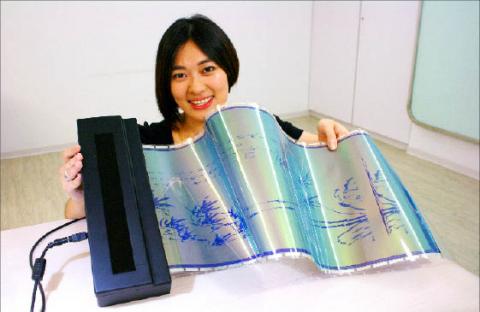The Industrial Technology Research Institute (ITRI, 工研院) has won two R&D 100 Awards, known in the trade as “the Oscars of the technology industry,” for eco-friendly technologies, the institute said yesterday.
The list of this year’s winners of the R&D 100 Awards was published on Wednesday and included the institute’s rewritable electronic paper — i2R e-paper — and a new type of polarizer protective film named HyTAC. Other winners of the awards from R&D Magazine this year include Dell, 3M and Hitachi.
The rewritable e-paper can achieve 300 dots per inch resolution with memory function and does not consume electricity, the institute said. To change the content, the user simply puts the paper into a thermal writing device to remove the old image and reuse the paper in a single step, it said. The paper can be used multiple times.

Photo courtesy of the Industrial Technology Research Institute
The technology could be used to produce digital books and pictorials without restrictions on length, as well as for electronic bulletin boards, digital billboards and other innovative applications, the institute said.
The ITRI said it started its research on HyTAC in 2003. The protective film uses a unique organic and inorganic nano-material with a variety of technologies. The highly transparent optical film and low-toxic manufacturing process can also replace the TAC film used in current polarizers, which require expensive processing equipment that pushes up production costs, the institute said.
This is the fourth straight year that ITRI has won an R&D 100 Award. Its previous winners include its on-chip AC LED lighting technology, high-safety STOBA lithium battery, eco-friendly fire retardant material REDDEX, regional 2D/3D switching 3-dimensional display and multipurpose flexible electronic substrate technology and other innovative inventions.
The award ceremony this year will be held in Orlando, Florida, in October, the institute said.

Taiwanese suppliers to Taiwan Semiconductor Manufacturing Co. (TSMC, 台積電) are expected to follow the contract chipmaker’s step to invest in the US, but their relocation may be seven to eight years away, Minister of Economic Affairs J.W. Kuo (郭智輝) said yesterday. When asked by opposition Chinese Nationalist Party (KMT) Legislator Niu Hsu-ting (牛煦庭) in the legislature about growing concerns that TSMC’s huge investments in the US will prompt its suppliers to follow suit, Kuo said based on the chipmaker’s current limited production volume, it is unlikely to lead its supply chain to go there for now. “Unless TSMC completes its planned six

Intel Corp has named Tasha Chuang (莊蓓瑜) to lead Intel Taiwan in a bid to reinforce relations between the company and its Taiwanese partners. The appointment of Chuang as general manager for Intel Taiwan takes effect on Thursday, the firm said in a statement yesterday. Chuang is to lead her team in Taiwan to pursue product development and sales growth in an effort to reinforce the company’s ties with its partners and clients, Intel said. Chuang was previously in charge of managing Intel’s ties with leading Taiwanese PC brand Asustek Computer Inc (華碩), which included helping Asustek strengthen its global businesses, the company

Power supply and electronic components maker Delta Electronics Inc (台達電) yesterday said second-quarter revenue is expected to surpass the first quarter, which rose 30 percent year-on-year to NT$118.92 billion (US$3.71 billion). Revenue this quarter is likely to grow, as US clients have front-loaded orders ahead of US President Donald Trump’s planned tariffs on Taiwanese goods, Delta chairman Ping Cheng (鄭平) said at an earnings conference in Taipei, referring to the 90-day pause in tariff implementation Trump announced on April 9. While situations in the third and fourth quarters remain unclear, “We will not halt our long-term deployments and do not plan to

TikTok abounds with viral videos accusing prestigious brands of secretly manufacturing luxury goods in China so they can be sold at cut prices. However, while these “revelations” are spurious, behind them lurks a well-oiled machine for selling counterfeit goods that is making the most of the confusion surrounding trade tariffs. Chinese content creators who portray themselves as workers or subcontractors in the luxury goods business claim that Beijing has lifted confidentiality clauses on local subcontractors as a way to respond to the huge hike in customs duties imposed on China by US President Donald Trump. They say this Chinese decision, of which Agence